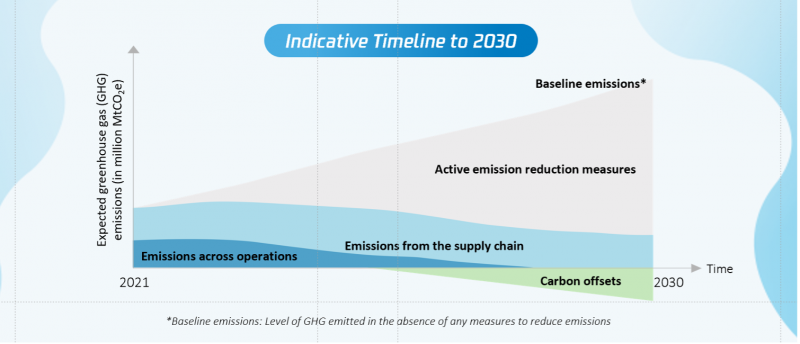- Tencent pledges to achieve carbon neutrality in its own operations and across its supply chain
- The company is targeting to use green power for 100% of all electricity consumed by 2030
PVTIME – On February 24, Tencent announced its plan to achieve carbon neutrality in its own operations and supply chain by no later than 2030. The world-leading internet and technology company also committed to using green power for 100% of all electricity consumed by the end of the decade.
“It is Tencent’s responsibility as a global technology leader to help the world achieve carbon neutrality, and it’s also an essential part of our vision to use ‘tech for good’,” said Pony Ma, Chairman and Chief Executive Officer of Tencent. “Not only do we believe this is the right thing to do for society, but we are eager to play our part as the global community progresses towards a carbon neutral and more sustainable future.”

Achieving Carbon Neutrality across Operations and Supply Chain
Tencent began an internal review of its greenhouse gas emissions in early 2021. The findings over the past year, published in the Tencent Carbon Neutrality Target and Roadmap Report, serve as the foundation for the company’s carbon neutrality goals.
The report notes Tencent’s total emissions were equivalent to 5.111 million metric tons of carbon dioxide in 2021, broken down into the following three categories:
- Direct greenhouse gas emissions from sources owned or controlled by Tencent (Scope 1) accounted for 0.4% of total emissions.
- Emissions from the generation of power and other energy purchased for Tencent operations (Scope 2) accounted for 45.9% of total emissions.
- Indirect emissions generated from the supply chain (Scope 3) accounted for 53.7% of total emissions.

Tencent plans to prioritize the use of active emissions reduction measures while keeping the use of carbon offsets to a minimum. To reach its net zero goal, Tencent will implement the following key initiatives:
- Improve resource efficiency by lowering energy consumption per unit of output throughout its operations.
Enhanced Energy Efficiency in Tencent Offices
Tencent has obtained several LEED Gold certifications and managed energy consumption for all its owned and rented office space in China.
Modular Data Centers and Improving PUE
Tencent’s fourth-generation T-Block technology enables data centers to be modular and prefabricated, saving 250 million kWh of electricity a year for a campus with 300,000 servers. T-Block can lower PUE to 1.3 and as much as 1.06.
Innovations in Heating and Cooling Technology
Explore energy-saving cooling technologies and upgrade heat recovery systems across Tencent’s data centers.
Tnebula AI Platform
The new Tnebula carbon management platform, in use in more than 100 data centers globally, can automatically and accurately acquire energy data in real time and conduct refined classification, statistics and scientific modeling to provide emission reduction solutions.
- Significantly increase the proportion of renewable energy use, especially in electricity consumption. Tencent will also actively participate in green power trading and explore investments in renewable energy projects.
Distributed Rooftop Photovoltaic Systems at Data Centers
More than 80 MW of new energy projects have been built, or are being built, in Tencent data centers. The expected annual power generation capacity will exceed 80 million kWh after completion.
Microgrid Technologies
Tencent is planning to connect energy storage power stations (e.g. in Qingyuan Qingxin Park and Shanghai Qingpu Park) to enable flexible and adjustable power utilization at data centers.
Renewable Energy Procurement
Tencent has committed to purchasing 504 million kWh of renewable energy in 2022 and secured 6 wind and solar projects’ annual partial generation capacity.
Centralized Renewable Energy Power Plants
Exploration of centralized renewable energy power plants, with a focus on onshore wind and solar technologies, as well as emerging power generation methods such as offshore wind power
- Adopt carbon offsets for the remaining segments that cannot otherwise be reduced.
Nature-Based Solutions (NBS)
Explore nature-based solutions (NBS) like forestry and ocean carbon sinks, as well as the development of emerging carbon sink technologies. Tencent is also exploring new ways to support sustainable agriculture.
Emerging Carbon Offset Technologies
Tencent will also support the development of emerging carbon offset technologies.
Helping Our Community Achieve “Net Zero”
In addition to achieving its own carbon neutrality goal, Tencent intends to play a leading role in driving change towards a low-carbon society by fostering open innovation and knowledge sharing, and leveraging the reach and influence of its platforms and products. Tencent will focus on empowering three key stakeholder groups – consumers, businesses, and society – in the following ways:
- Consumers – Promote low-carbon lifestyles and green consumption trends through the development of sustainability-themed mini programs and mobile games.
- Businesses – Facilitate a low-carbon transformation for the industrial sector by offering technologies to digitalize business operations and manage emissions reduction.
- Society – Support the advancement of critical technologies for carbon neutrality by pursuing partnerships in areas including the carbon capture, utilization, and storage (CCUS) value chain.
Led by its mission to use “tech for good,” Tencent established its Sustainable Social Value Organization (SSV) in 2021 to explore high-quality and sustainable pathways to net zero, share social value, and improve social well-being through continuous innovation in technology, products, and operating models. Tencent leads the carbon neutrality professional committee at the Internet+ Development Association of China (IDAC), which is establishing an open access patent technology organization to make it easier for enterprises to use low-carbon technologies for free.
Tencent has also joined the Science-Based Carbon Targets initiative (SBTi) and plans to join RE100. RE100 is a global renewable energy initiative led by The Climate Group (The Climate Group) and the Carbon Disclosure Project (CDP) that requires participating companies to commit to a 100% green electricity schedule between 2020 and 2050 and make plans year by year.
The company will disclose interim progress towards a reduction of emissions and other carbon-neutral efforts in its annual ESG reports, which are available to the public on the Tencent website.
Details of Tencent’s goals for sustainable development and carbon neutrality can be found in the company’s inaugural Tencent Carbon Neutrality Target and Roadmap Report.










